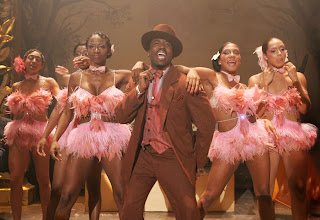Here is another case where the critical herd mentality destroyed a film. Leading u
p to its release in 2006, Idlewild, the 1930s-era musical set in an African-American speak-easy/nightclub in a small town in the southern US, was already being strafe bombed by critics as an unreleasable catastrophe. Conceived by video-director Bryan Barber as a project for the two-man funk/hip-hop band, OutKast (Barber directed their videos, including their endlessly creative “Hey Ya” clip), Idlewild committed the cardinal sin of ... well, I'm not sure what.
Sure, the story is clichéd. Rooster (Antwan A. Patton – aka, Big Boi in OutKast) is the manager/singer in the aforementioned night club in the backwater town of Idlewild. Through the course of the picture, he has to contend with mobsters (especially the psychopathic Trumpy – Terrence Howard) who want to take over the club and use it for their own nefarious purposes. He is also juggling a bevy of beauties (including his wife), convincing the recently arrived girl singer, Angel (Paula Patton – no relation to Antwan), to stay, and keeping his talented but conflicted pianist, Percival (André Benjamin, aka André 3000 in OutKast), in the band. Percival is torn between helping his widowed father (Ben Vereen) in his business (Vereen's the local mortician) and composing great music that will let Percival escape the town and the club. Of course, he sees Angel, and her beautiful voice, as the final key to help him leave. Trouble happens; people die.
 |
| Antwan A. Patton on stage in Idlewild |
Perhaps the picture doesn't really hang together, and sometimes Barber gets lost in visual trickery, but during its several set pieces in the club, the film is positively electric. OutKast did all the music for the film in a mostly successful faux 1930s-jazz/pop style, and Barber's years shooting videos serves him well. The dancing by the 'club kids' that accompanies the music is fantastic. Watching those sequences, it's clear that Barber did his homework. In the 1930s, in Harlem, New York, there was a legendary club called the Savoy Ballroom. The club took up an entire block. Inside, there were two bandstands, one at either end of the space. The music and the dancing never ended. As one band went on break, the other took up the beat and vice versa. The dancers – called Lindy Hoppers – practically ran the show. If the band was not up to the Lindy Hoppers' very high expectations, the band would be unceremoniously chased from the stage. Barber captures that energy and passion perfectly in his dance sequences in Idlewild. In this case, there's only one stage, but when the band falters, the dancers waste no time letting them know it.
Other sequences work in an almost mystical manner (I get the feeling that Barber is channelling African-American myths and legends during several moments in the movie). One in particular is especially successful. Rooster is driving to confront the mobsters when he comes across an old truck stopped on the road. He cannot get around it, so he gets out and goes to talk to the driver. The driver is an old woman played by Cicely Tyson. Tyson tells him that God spoke to her and told her to stop her truck there. She wasn't sure why. After a few seconds, she determines that it was Rooster she was waiting for. She gives him a Bible, her blessing and then moves off. On some levels, you know the sequence is here strictly to serve some plot purpose, but it works on the layer of myths and legends too.
 |
| Andre Benjamin & Antwan A. Patton |
There is one issue in the film that may have been what some critics reacted to. The original manager of the club, before Rooster takes over, is an uncomfortable stereotype. Faizon Love plays Ace, the fat, corrupt, lazy, greedy, sleazy club manager too well. He is a stereotype you don't expect in a picture like this, and it is a relief when he exits the film. Other performers fair far better. Both members of OutKast are not great actors, but they serve the material well; Paula Patton has the look and the pipes (supposedly she did her own singing) to be convincing as the girl-singer; Terrance Howard can do a psychopath in his sleep, and he acquits himself fine here; and Cicely Tyson, in her one scene, is magical.
Upon its release,
Idlewild was dumped by its studio, Universal, and the film subsequently flopped badly, and that's a pity. Despite its flaws, it is a film that has stuck with me in the weeks since I've seen it. Because it was such a flop, it might be difficult to find a DVD copy in your local Blockbuster, but savvy independent establishments are sure to have it. Do yourself a favour and dig it up.
– David Churchill is a film critic and author of the novel The Empire of Death. You can read an excerpt here. Or go to http://www.wordplaysalon.com for more information.




Needless to say Outkast is possibly the most successful hip-hop/rap duo of the last 15 years. They are so dynamic that they have seemingly locked down all corners of the listener market. I don't know how familiar you are with their music, but if you haven't listened to Aquemini you should really give it a go. They are insanely talented. Meanwhile, I'll go find this movie and watch it. Great stuff.
ReplyDelete